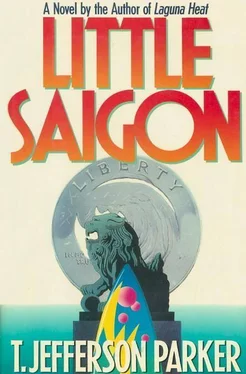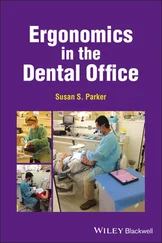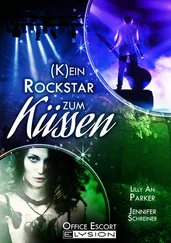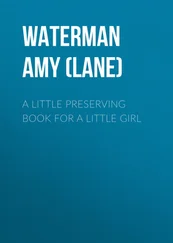Frye looked out his window. Shouldering moonlight, the hills stooped like peasants, humble, uninformed of their future. He read the sign as he passed it:
FUTURE SITE
LAGUNA PARADISO
EDISON & BENNETT FRYE
A FRYE RANCH DEVELOPMENT
Bennett had stopped in a left-turn lane. Frye moved to the far right and sped past. In his rearview he saw the van wait for the traffic to clear, then ease across the highway toward the development entrance. Nothing more than a dirt road, he thought, winding back into the country. I’ll just get on it, wind back and keep winding until the road disappears, then I’ll get out and walk until the continent ends, then I’ll swim until the water dries up, and when the water is gone I’ll move through the air, like a vapor, a hawk, an angel...
He watched Bennett’s taillights bounce toward the gate. A moment later he yanked his wheel hard and spun a U-turn. By the time he came to the gate and another big sign announcing the Laguna Paradiso, the van had disappeared over a hillock.
He killed the headlights, got out, and tried the lock. The dust from the van settled around him. The lock wouldn’t budge. Just as well, he thought, they’d spot the Cyclone anyway. He backed the car up the highway, nearly out of sight around a curve, then wandered back, jumped the gate, and started down the dirt road.
The Coast Highway traffic was soon behind him. He looked ahead in the darkness for Bennett’s van, but all he could see was the pale strip of graded earth blending into the hills. The smell of dust hovered over the road, along with the scrubbed aroma of sage and eucalyptus, a hint of oranges from the east, of ocean from the west. He stopped, turned his ear away from the onshore breeze: an engine died in the middle distance; doors opened and closed. The road climbed steeply over the next rise, leveled, then rose again. Frye stopped at the top and surveyed the meadow, wide and touched by moonlight. The van sat in the middle.
Beside it was a dark transport helicopter, rotor blades drooping. Crawley and Nguyen had swung open the van doors and started moving the crates into the cargo bay of the waiting chopper. Bennett stood nearby, with two men that Frye couldn’t recognize. He squatted behind a small oak and watched. It could have been fifteen minutes, or two hours. He counted the cases as they were loaded.
A family of skunks waddled past, not ten feet away, a stinking mom and three perfect miniatures. Frye held his breath and kept counting: twenty-six cases in all, heavy enough to require two men, even when one was Donnell.
When he turned to watch where the skunks had gone he saw the form on a ridge behind him, a kneeling hump with a large mirror of moonlight where its eyes should be. It was still as a rock. It gave off a series of soft clicking noises. Paul DeCord focused one end of the long lens.
Frye almost shot through the oak branches when the helicopter started, an earth-shivering whine that set the blades slowly into motion. Donnell was closing the van doors. Nguyen had already climbed in. The man that Bennett was talking to lowered his hand and Bennett shook it, then swiveled toward his van. Frye turned slowly back to DeCord, but only the ridge was there. Not much choice, he thought, but to stay put.
The helicopter engines accelerated, the blades slowly straightened, the meadow grass whorled and flattened beneath them. Bennett’s van backed away without sound. When the machine lifted into the air, Crawley ran over and kicked up the flattened grass where the tires had rested. The van circled, headlights spraying light onto the meadow.
Frye knew he should press himself against the earth and put his face to the dirt. Avoid detection. Protect his night vision. But he just sat there while the chopper roared over, shaking the tree, raising leaves and debris. He closed his eyes.
Then the pounding of the engines gave way to the minor workings of the van as it lumbered up the road toward him. A moment later it was past, a set of red taillights in the dust.
He leaned against the oak tree and finally opened his eyes again.
A road. A meadow. The muted hiss of traffic on Coast Highway. The future site of Laguna Paradiso, Edison and Bennett Frye, a Frye Ranch Development.
He turned on the television and every light in his house.
Cristobel had left a message that said: “Didn’t mean to freeze you. I’m still touching the water with my toes. Cold sometimes. Thanks for bringing back my dog. See you soon. How about lunch tomorrow?”
He poured a huge glassful of vodka.
The nurse at Westminster Hospital would tell him only that Tuy Nha had been admitted that night.
He dragged his old typewriter from the cave region, set it up on the kitchen table, and started writing the story of Tuy Xuan.
He told about the killings in Paris, Australia, and San Francisco. He told about the arms and legs that Xuan and his daughter helped to ship to Vietnam. He told about Colonel Thach’s vengeance and the tiny war the refugees waged against him, the kidnapping of Li, the secret photographers, the FBI, the flatfooted cops, the gangs that hated each other, the kids that loved Li.
An hour later he read it over, and all he saw were holes. What evidence is there that some distant colonel ordered Xuan’s murder? That said colonel had orchestrated murders around the world? What witness could testify that the supplies Xuan sent weren’t legs but guns? What did it matter that stubborn refugees who’d already lost the war were still at it in their pitiful, impotent way? What connection was there between the kidnapping of Li and the politics of Little Saigon? She was part of the richest family in the county, wasn’t she? Who cared that people loved her and looked up to her — people loved and looked up to Jimmy Swaggart for chrissakes. And Tuy Xuan’s study was torn apart, wasn’t it? Who’s to say that vicious thieves hadn’t taken his savings — Vietnamese don’t put their money in banks, you know — and signed Thach’s name to divert attention from them? And how much money did Xuan take in, to purchase his “prosthetics”? Did a little get into his pocket, perhaps? And who knows what kind of shady deals the Vietnamese here really make, anyway. Maybe the old man had it coming. Maybe in the war, in his patriotic fervor, Xuan had rolled a few heads himself.
Frye could picture Ronald Billingham hovering over his desk, tossing the copy back to him and saying, “You can’t accuse a man of murder when nobody saw him do it and he was halfway around the world when it happened.
This is America, Chuck, You’re a little too close to this one, buddy. I’ve got an art museum fundraiser tonight — cover it with a photog and don’t drink all the champagne.”
Besides, a story like that would expose Bennett.
Frye tossed the sheets to the lacerated couch.
Bennett called at quarter of four. “Wiggins just told me about Xuan, Chuck. I was out tonight or I’d have—”
“I know. You were at the Paradise.”
“Who told you that?”
“I watched. And so did Paul DeCord. With a camera.”
“It’s real important, Chuck, that you don’t say anything to anyone at this point. I can’t stress how—”
“I figured that.”
The silence seemed to go on forever before Frye spoke again. “Do you know about Colonel Thach?”
“You can’t spend much time in Little Saigon and not hear about Colonel Thach.”
“Did Wiggins tell you what they did to Xuan?”
“They shot him.”
“Wiggins made me swear I wouldn’t say anything, but Xuan wasn’t shot. He was beheaded.”
“Jesus, Chuck.”
“Thach could have engineered this, couldn’t he?”
“I’ve been praying since Sunday night that he didn’t.”
Читать дальше












